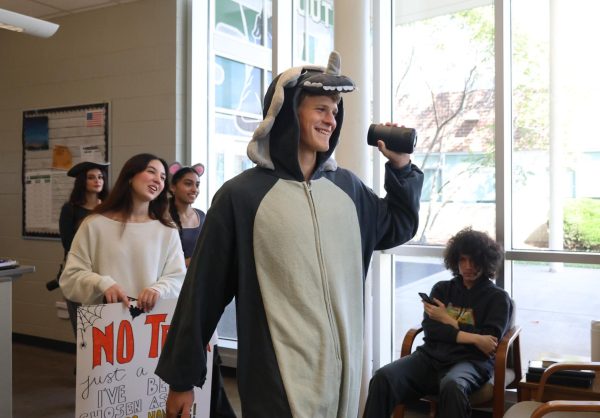A new phone policy is created to reinforce values of education
In each classroom, there is a gray area many students occupy on a daily basis. This gray area is the phone usage that is constantly present. Many students use technology for their studies, checking their grades and monitoring assignments.
However, junior Ethan Operach said students constantly checking their phones for social media updates and texts can be disruptive to a class and can hinder the classroom learning process.
As a member of the Student Council executive board, junior Reed Krewson was tasked with the expansion and creation of technology policy.
“[Principal Scott] Roberts came and talked to us and said that this year, we were going to design a new phone policy,” Krewson said. “We delegated a committee to make up a new phone policy, and after they kind of had a rough draft, we all as a Student Council helped to edit and make it what it is today.”
The committee found problems with the current phone policy, such as a lack of true punishment, Krewson said. He said they decided to find these problems and attack them accordingly.
“The problem is that if teachers see a problem with phones like they do right now, they are more likely to just take phones out of the picture completely, rather than just using them for academic purposes,” Krewson said.
Krewson said this ends up resulting in less technology use within lessons and more under-the-radar use. He said he is frequently tempted to be on his phone when he shouldn’t be but that he thinks this new policy will eliminate the distraction at the source.
“I think it’s that problem with temptation where we’re more likely to use it rather than pay attention to what we’re supposed to be doing, and that is reflected with poor grades,” Krewson said.
Although there was a phone policy in place before this school year, Krewson said the committee wanted to create a policy that was more grounded.
“What we’re doing with this new phone policy is just giving teachers the tools to actually enforce it, which is what I think the key problem was that that was missing in the first plan,” Krewson said.
The new phone policy allows teachers to remain consistent in their consequences through the school while still applying the ideas they deem necessary in their classroom Krewson said. Operach said he feels like the old phone policy was not respected and as a result was not effective.
“I’ve heard the new policy is pretty much the same as the old one, just with stronger consequences and I feel like that will be easier for the teachers to enforce,” Operach said.
Krewson said he likes the new policy, but said there is more to do.
“I believe there’s a lot more to be done, at least if we’re talking about cell phones,” Krewson said. “I feel like there’s still a lot of work to be done to implement.”
However, Krewson said another policy will be necessary in the future with the upcoming increase in student computer usage when students receive MacBook Airs in January.
From a teacher’s perspective, Spanish teacher Carolyn Zeligman said she believes the new phone policy will be extremely effective, with the proper management, simply because students do not want to lose Timber Time.
“Ninety percent of the time, [phone usage] is non-academic,” Zeligman said.
She said phones are really only used in her classroom to look at vocabulary, but have a much greater potential.
“I think the thing I like the best is that we can get rid of textbooks,” Zeligman said. “Because for the majority of the subject matter, virtually everything is online, and you can actually find things online that are up to date as of today. I’ve talked about that with friends who teach history, for instance, wondering ‘Why on earth would you use a textbook when you can find authentic resources online?’ Plus rebuttals or other subjects that pertain to that that are written so recently.”
She also said students as well as teachers need to follow the policy in order for it to be successful.
“I think that [teachers] should follow the same [phone] rules as students do,” Zeligman said. “I just hope we will all be consistent with it and try to support it, I’ve already heard a couple teachers saying, ‘I’m not going do that,’ and you just can’t do that; it’s just not fair.”








